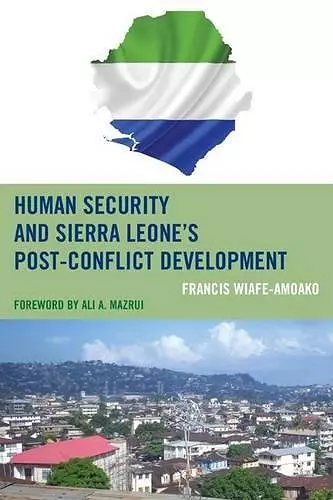Human Security and Sierra Leone's Post-Conflict Development
Format:Paperback
Publisher:Bloomsbury Publishing PLC
Published:15th Apr '16
Currently unavailable, and unfortunately no date known when it will be back
This paperback is available in another edition too:
- Hardback£82.00(9780739191330)

Achieving security and development in the post-conflict era is a challenge with which stakeholders have to grapple. While stakeholders are quick to claim success when physical hostilities cease between the belligerents, ensuring sustainable peace has been a daunting task. In some countries in Africa, the post-conflict era is characterized by organizing elections to ensure greater political participation. It is believed that elections will begin a process of openness and trust in the governing system. A supplement to electoral democracy has been power sharing arrangements used to resolve post-election violence, and ensure stability within the state. However, what underlie most conflicts in Africa is the marginalization and lack of an enabling environment to achieve individual life objectives. Policies and strategies to achieve security and enhance development post conflict have, at best, been an extremely slow process and sometimes elusive. In Sierra Leone, for instance, though the official declaration of the end of war and the successful general elections held in 2002, 2007, and 2012 have led to some domestic stability, developmental targets in the post-conflict era have proceeded at a snail’s pace. The country continues to rank at the bottom of most UNDP human development indicators since 2002.
Human Security and Sierra Leone’s Post-Conflict Development analyzes the extent to which human security issues have been addressed and subsequently implemented in the post-conflict reconstruction process. While Sierra Leone has made tremendous efforts at implementing reforms in the areas of political sensitization, promotion of civil rights and civil liberties, as well as personal security, the lack on the part of the government to effectively address the unemployment problem has negatively affected security and developmental targets. Thus, the post-conflict management strategies in Sierra Leone fail to secure and promote some aspects of human security, leading to fragile peace and slow progress in achieving sustainable security and development. Human security is an all-encompassing phenomenon and must be addressed to achieve overall wellbeing of the people, especially in post-conflict environments.
This compact book focuses on 'human security' as defined in the 1994 UN Development Program report. Wiafe-Amoako concentrates on four of its seven elements, combining them with detailed analysis of post-2002 Sierra Leone legal, economic, and security changes. The country was ripped by civil war during the 1990s, the result of spillover from conflict in neighboring Liberia, blatant ethnic favoritism by Sierra Leone’s rulers, inequitable exploitation of the country’s mineral resources, and the like. More than two million people were displaced. Reestablishing basic security and restarting development proved difficult in the face of multiple challenges. This book is organized into six chapters. The author first puts human security into the 'conflict puzzle.' He then concentrates on political and civil reforms, economic reforms, and personal security reforms. The concluding chapter looks broadly at human security in light of post-conflict policy changes. Wiafe-Amoako interviewed approximately 100 government officials, primarily in the capital and provinces affected by the civil war, in addition to examining statutory changes. . . .Overall, a good summary of recent changes. Summing Up: Recommended. Upper-division undergraduate and graduate collections. * Choice Reviews *
Human Security and Sierra Leone’s Post-Conflict Development is an empirically grounded and theoretically sophisticated analysis of the political predicament of an African state, Sierra Leone. Although the book is primarily about Sierra Leone, the analyses in it also heavily draw upon the experiences of other post-colonial African states. Dr. Wiafe-Amoako sees ensuring 'human security' as the key for overcoming the challenges faced in Africa by fragile states as well as by those in the post-conflict phase. A new paradigm of thought in our quest for solutions to an old problem, this is a timely book and a must-read for policy-makers and Africanists alike. -- Seifudein Adem Ph.D, associate director, Institute of Global Cultural Studies, State University of New York, Binghamton, New York
In its country profile, the British Broadcasting Corporation noted that Sierra Leone ‘emerged from a decade of civil war’ which did not only cause the death of thousands of its people, but also a war which was marked with a ‘lasting feature … of atrocities committed by rebels, whose trademark was to hack off the hands or the feet of its victims.’ It is in this regard that I view Francis Wiafe-Amoako’s Human Security and Sierra Leone’s Post-Conflict Development as one of a kind. Even though there are many books and articles which have dealt with post-conflict reconstruction in Africa, none of them has so particularly focused on human security. Of all of a conflict-ridden country’s resources, human resources are the key victim. This is because conflict does not only cause death and incapacitation of people, it also devastates the trust environment, the key mechanism of social capital. This is often to a point where even when open hostility is declared to be over, a sense of fear and insecurity continues to loom over the area concerned, making it difficult for survivors to return home to resume normal life. I thus recommend Human Security and Sierra Leone’s Post-Conflict Development to government officials and their development partners as well as college and graduate instructors and students with an interest in Sierra Leone in particular and Africa in general. -- Ben K. Fred-Mensah, Howard University
ISBN: 9780739199701
Dimensions: 224mm x 154mm x 12mm
Weight: 231g
158 pages